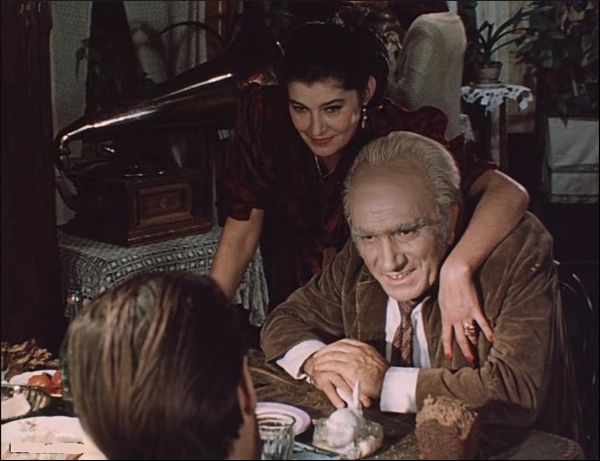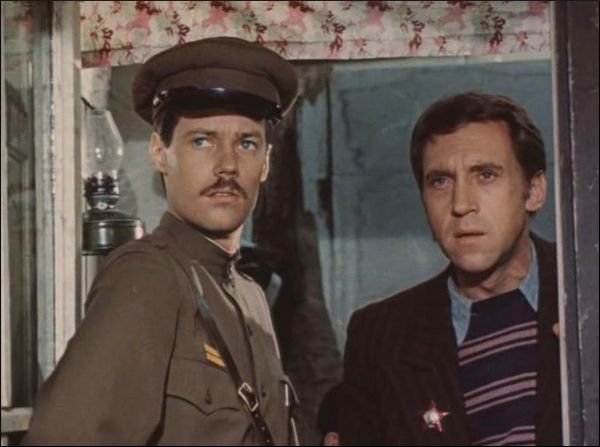The Meeting Place Cannot Be Changed, a five-part miniseries released in 1979, is the story of the Moscow police department’s fight against organized crime in the immediate aftermath of the Soviet Union's WWII victory. Young, idealistic army veteran Sharapov returns to Moscow to join the police force and is assigned to the department tasked with investigating organized crime, led by the charismatic Gleb Zheglov (played by iconic Russian bard singer Vladimir Vyssotski). On Sharapov's first day, one of the department’s undercover agents is unexpectedly murdered during a supposedly safe meeting with members of the criminal organization Black Cat, a group widely known for its bloody shop robberies, which operates with such frequency that stopping it quickly becomes the number one priority of Zheglov and his department.
"A lot of phrases from the film, especially those uttered by Zheglov, are to this day heavily quoted in Russia and have reached an almost proverbial status."
Along with following the gang, Zheglov and Sharapov also start investigating the murder of a small-time actress. Zheglov quickly writes the case off, blaming the woman’s estranged husband, but Sharapov insists on the man’s possible innocence and convinces Zheglov to investigate further. A sharp contrast between the moral thought processes of the two men emerges. As the search progresses, Sharapov becomes gradually disillusioned with the realities of the dirty world of police investigations and with the complicated web of stubbornness and human weakness he has to face when looking for an enemy who is shadier and more evasive than he is used to with his black-and-white military thinking. Zheglov, on the other hand, is a hardened player, well-versed in dealing with the Moscow underworld. He does so according to his personal moral convictions, planting evidence, intimidating suspects, and stopping at almost nothing to advance his repeatedly proclaimed credo of “Vor dolzhen sidet' v tyurme” (A thief belongs in prison).

The conflict between these two minds, one idealistic and the other utterly cynical, stands at the center of the film and drives the two investigations, posing complications and arguments along the way, as Sharapov and Zheglov follow a string of answers through various layers of the Moscow underworld. The film's final showdown is a tensely acted and suspenseful spectacle.
A lot of phrases from the film, especially those uttered by Zheglov, are to this day heavily quoted in Russia and have reached an almost proverbial status. Popular phrases include: “У нищих слуг нет/U nisshikh slug net” (Beggars don't have servants), “Cтарший приказал!/ Starshyiy prikazal” (The eldest has commanded it!), and “Не учи учёного, гражданин Копчёный/Ne uchi uchenogo, Grazhdanin Kopchyonnyi” (Don't teach the taught, citizen Kopchyonnyi). The most famous quote is perhaps Zheglov’s vodka-fueled rant: "If there is a devil in this world, he's not a goat-footed horn-bearer, but a dragon of three heads. Those heads are sneakiness, gluttony, and treachery. And should one of them bite a man, the other two will eat him up completely."
"Vyssotski’s Zheglov is one of the most iconic performances in Russian cinema, especially since Vyssotski died in connection with drug and alcohol abuse a year after production was concluded."
The film draws linguistic contrasts between the speech of its characters. Zheglov’s is rough, concise, and to the point, but laced with disillusioned sarcasm. Sharapov’s idealism and naiveté is mirrored in his boyish, good-hearted pronunciation. Near the end of the film, as he is about to go undercover into the heart of the notorious gang, he adapts his manner of speech to fit the criminal slang of the 1940s, which is heavy on now-outdated expressions, such as “musor” (garbage) for "cop," “pero” (feather) for "knife," “malina” (raspberry) for "gang hideout," and “shippach” for "pickpocket."
Vyssotski’s Zheglov is one of the most iconic performances in Russian cinema, especially since Vyssotski died in connection with drug and alcohol abuse a year after production was concluded. It's impossible to talk about Russian cinema without mentioning Meeting Place – as it is often abbreviated – and equally impossible to find a Russian who has not seen this film.





